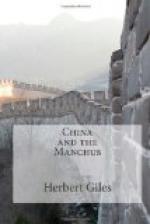During a great part of the last eight years described above, an ordinary observer would have said that the Manchus had already sufficient troubles on hand, and would be slow to provoke further causes of anxiety. It is none the less true, however, that at one of the most critical periods of the rebellion, China was actually at war with the very power which ultimately came to the rescue. In 1856 the Viceroy of Canton, known to foreigners as Governor Yeh, a man who had gained favour at the Manchu court by his wholesale butchery of real and suspected rebels, arrested twelve Chinese sailors on board the “Arrow,” a Chinese-owned vessel lying at Canton, which had been licensed at Hongkong to sail under the British flag, and at the same time the flag was hauled down by Yeh’s men. Had this been an isolated act, it is difficult to see why very grave circumstances need have followed, and perhaps Justin McCarthy’s condemnation of our Consul, Mr (afterwards Sir Harry) Parkes, as “fussy,” because he sent at once to Hongkong for armed assistance, might in such case be allowed to stand unchallenged; but it must be remembered that Yeh was all the time refusing to foreigners rights which had been already conceded under treaty, and that action such as Parkes took, against an adversary such as Yeh, was absolutely necessary either to mend or end the situation. Accordingly, his action led to what was at first an awkward state of reprisals, in which some American men-of-war joined for grievances of their own; forts being attacked and occupied, the foreign houses of business at Canton being burned down, and rewards offered for foreigners’ heads. In January, 1857, an attempt was actually made in Hongkong to get rid of all foreigners at one fell stroke, in which plot there is no doubt that the local officials at Canton were deeply implicated. The bread was one day found to be poisoned with arsenic, but so heavily that little mischief was done. The only possible end to this tension was war; and by the end of the




